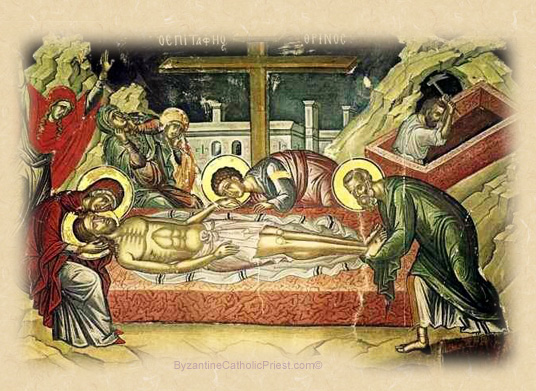The death of our Lord proves that there is nothing new under the sun.Exodus 33:11-23;
Job 42:12-17;
Isaiah 52:13-54:1;
1 Cor. 1:18-2:2;
Matt. 27:1-38;
Luke 23:39-43;
Matt. 27:39-54;
John 19:31-37;
Matt. 27:55-61. Holy & Great Friday. Solemn Vespers & the Re-enactment of the Burial of Our Lord.
Return to ByzantineCatholicPriest.com. |
10:24 AM 4/7/2012 — The event we remember this evening was not something that surprised our Lord, nor was it a disappointment to him. Many of his own disciples, we know, did not understand how what was happening was actually intended by our Lord. Peter, himself, the head of the Apostles, tried to prevent it in the Garden on the Mount of Olives as we read last night, until our Lord corrected him. Those of you who may have taken Latin in high school might remember this phrase:
Lustra sex qui iam peracta,
tempus implens corporis,
se volente, natus ad hoc.
It was a Latin poet, Venantius Fortunatus, in the Sixth Century, expressing the faith of the Church: se volente, natus ad hoc—freely willed, born for this. Jesus wants this. He wants this cross. He wants this passion. He wants this suffering. Not because he's a masochist, but because he's a Savior. This is the very reason he came to earth. And as our Lord gazed up along the way to the top of the mount of Golgotha, he saw it all, for he was God: he saw how the cross was to be loved and to be adored because he was going to die on it; he saw the witnessing saints who,  for love and in defense of the truth, were to suffer a similar death; "he saw the triumph and the victories Christians would achieve under the standard of the cross. He saw the great miracles which, with the sign of the cross, would be performed throughout the world. He saw so very many men and women who, with their lives, were going to be saints because they would know how to die like him, overcoming sin."* for love and in defense of the truth, were to suffer a similar death; "he saw the triumph and the victories Christians would achieve under the standard of the cross. He saw the great miracles which, with the sign of the cross, would be performed throughout the world. He saw so very many men and women who, with their lives, were going to be saints because they would know how to die like him, overcoming sin."*
But, that's not all he saw. He saw a lot more. He saw the cross become an enigma once again. He saw future generations of men and women bearing his name—calling themselves "Christians"—paying lip service to the cross upon which he was about to die, trying to live their lives as if it never happened, latching on to this particular thing he said or that particular thing he did before his death, saying, "This is why he came. Live by these words, and you are a Christian." He saw that. He saw us thousands of years before we were born, trying so desperately to have him without his cross, trying to scull some meaning out of the story of his life which pays no reference to the reason for it.
On Flowery Sunday we mentioned how the Church is often attacked during Holy Week, as if the practice of the Christian Faith somehow threatens the balance and symmetry of our secular society; and that this should not surprise us. Was this not exactly how they treated our Lord? Make no mistake: the decision to get rid of Jesus was made long before they dragged him before the Sanhedrin. He was in the way. The charge brought against him was blasphemy; and when no one came forward to give evidence, they went out and got two people who didn’t even know Jesus and paid them to lie, as we read in the Gospel yesterday. Joseph of Arimathea was the only member of the Sanhedrin to stand up and say, “This is wrong.” And what did they tell him? They were afraid that, if Jesus continued to grow in popularity, the Romans would intervene and occupy the Temple and take away their power. As Caiaphas said to Joseph in the Gospel of St. John, “Do you not consider that it is expedient for us that one man should die for the people, and not that the whole nation should perish?” having convinced themselves, as despots often do, that what’s best for the country is them; and whatever they have to do to keep themselves in power is a means justified by the ends.
It is, therefore, a blessing in disguise that our Church, and we as individuals, are given the opportunity to suffer as our Lord suffered: victims of those who fear the truth. And if we are able to take that aspect of our Lord’s passion and internalize it, then it can become the means by which we can bear all the crosses that we are forced to carry in our lives.
This evening, as you approach to venerate the sacred wounds of our Lord with your lips, embrace the wounds with your heart. Don't just venerate the image of our Lord upon the shroud. Don't just embrace the historical cross upon which Jesus died. But when you venerate the sacred wounds, venerate as well whatever wounds you are carrying, in whatever form of suffering or difficulty the Lord has allowed to come your way. And promise him that you will not try to deny it, because you understand that your cross, like his, is the door to heaven.
Father Michael Venditti
* L. de Palma, The Passion of the Lord.
|

